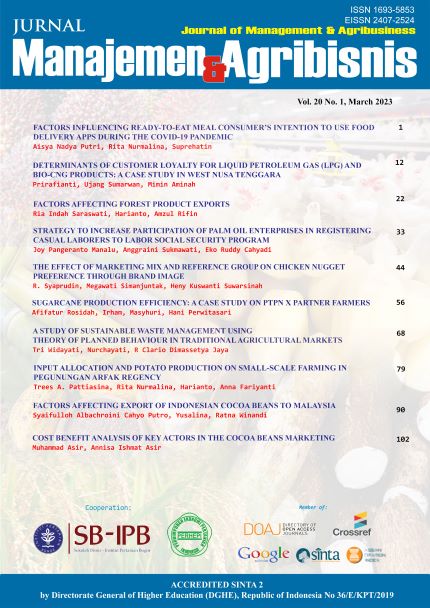Decision Making of Oil Palm Farmers in Choosing Rejuvenation Partners in Siak District
Abstract
Smallholder oil palm plantations in Riau have reached their economic age (25 years), resulting in decreased plantation productivity. One alternative to overcome this problem is oil palm rejuvenation (OPR). In implementing oil palm rejuvenation, there are two prominent partner institutions, the Village Unit Cooperative (VUC) and the Nucleus Estate-Smallholding (NES). As the main actors, farmers are in the position to choose partner institutions for oil palm rejuvenation. The purpose of this study was to find out the differences between the oil palm rejuvenation technology packages carried out by VUC and NES, and to identify the factors that influence farmers' decisions in choosing an oil palm rejuvenation partner institution. This research was conducted in the Kerinci Kanan District, Siak Regency. The data analysis used was descriptive and binary logistic regression. The technology packages carried out by VUC and NES partners have several differences, including types of seeds, number of plants per hectare, spacing, production potential, BPDPKS support, amount of interest paid, OPR budget plan, and sources of funds. The factors that influence farmers' decision-making in choosing OPR institutional partners are farmers' perceptions of income, the presence of extension services, and rights and obligations. Counseling plays an important role in establishing partnerships, by transferring technology to farmers so that the technology package implemented can increase the productivity and quality of oil palm.
Keywords: decision, NES partners, VUC partners, rejuvenation
Authors
Authors who publish with this journal agree to the following terms:
- Authors retain copyright and grant the journal right of first publication with the work simultaneously licensed under a Creative Commons Attribution License that allows others to share the work with an acknowledgement of the work's authorship and initial publication in this journal.
- Authors are able to enter into separate, additional contractual arrangements for the non-exclusive distribution of the journal's published version of the work (e.g., post it to an institutional repository or publish it in a book), with an acknowledgement of its initial publication in this journal.
- Authors are permitted and encouraged to post their work online (e.g., in institutional repositories or on their website) prior to and during the submission process, as it can lead to productive exchanges, as well as earlier and greater citation of published work (See The Effect of Open Access).

